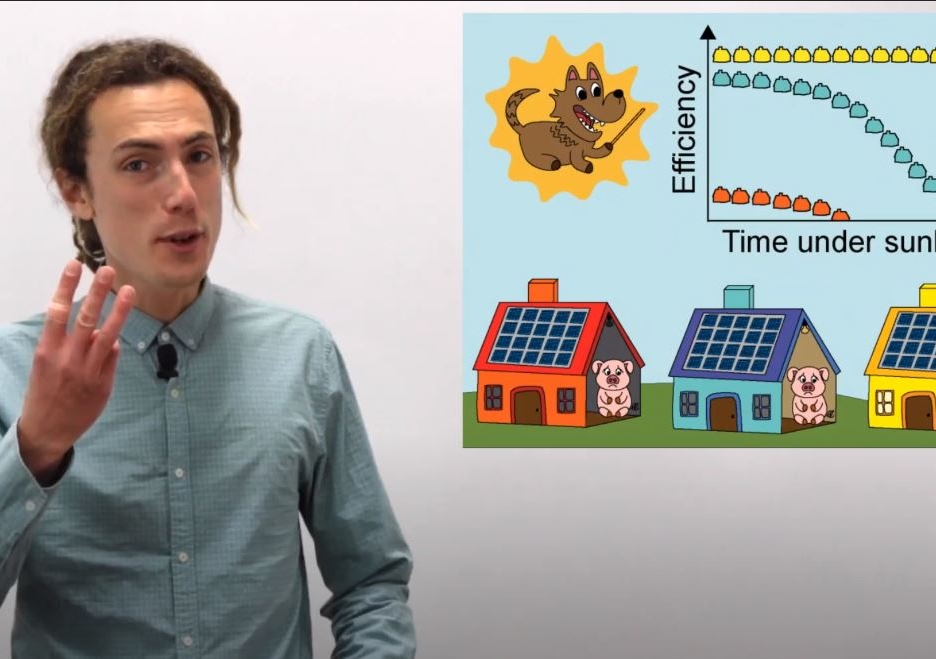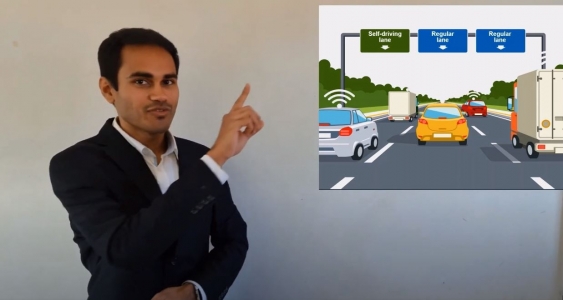A tale of the Three Little Pigs and their low-cost solar energy wows judges in 3 Minute Thesis Final
Imaginative solar cell presentation earns PhD candidate Bruno Vicari Stefani top prize in online UNSW 3MT grand final.
Imaginative solar cell presentation earns PhD candidate Bruno Vicari Stefani top prize in online UNSW 3MT grand final.

UNSW’s breadth and depth of doctoral research was on display as the popular 3 Minute Thesis Final turned into a virtual event for 2020.
Instead of presenting to an audience of hundreds as normal, this year’s finalists submitted video entries lasting just 180 seconds to explain their research and its importance in a clear and concise manner.
Topics included digital nomadism in a post-COVID world, the effect of subtitling swear words in movies, and targeting genes for brain cancer treatments.
But the winner of the $3000 top prize was Bruno Vicari Stefani, from the Faculty of Engineering, for his engaging presentation about developing highly efficient solar energy cells using low-cost materials – bringing the classic fairy tale of the Three Little Pigs into the modern day to illustrate his key points.
The judges - Indigenous Affairs reporter Ella Archibald-Binge, former ABC journalist and producer Edmond Roy, science presenter Natasha Mitchell, UNSW’s MCIC Foundations program manager Laura Earl, and UNSW’s Deputy Dean of Graduate Research Associate Professor Penny Martens – were captivated by the innovative way Stefani explained how combining hydrogen with low-cost silicon in solar panels can prevent them from losing efficiency over time.
Judge Natasha Mitchell said: “Bruno was a standout winner by really creatively using storytelling to explain his work. He developed the idea over the whole presentation and it was a great way of bringing his PhD journey alive for the viewers.”
Winner Stefani said: “I am so happy to win and I want to thank the University, but also the other competitors for raising the bar so high that I had to put in a lot of work. I also want to thank my supervisor Brett Hallam for all the support and opportunities he has given me throughout my PhD.”
Second place, and $1500, went to Shantanu Chakraborty from the Faculty of Engineering, for his presentation about research into the introduction of special traffic lanes reserved for self-driving vehicles. Chakraborty also won the ASPIRE prize and $500 after being chosen by Year 7-12 students from Liverpool Girls, Liverpool Boys and Matraville Sports High Schools.

Shantanu Chakraborty won the ASPIRE prize, and 2nd place overall in the 3MT competition, after explaining how self-driving lanes could be utilised in the future.
Third place in the main competition went to Emma Long from UNSW Science after she skilfully explained how eating with other people can influence our food intake.
The general public also had the chance to watch videos from all 24 finalists and vote for their favourite – with Lital Livni from UNSW Medicine receiving the People’s Choice award for her presentation into the development of altered sensations and pain following cancer treatments.
Overall, the 3MT judges were hugely impressed at the standard of all the finalists and the amount of complex material they managed to explain in such a short period of time.
UNSW Associate Professor Penny Martens said: “In the past they would have presented in front of a large audience and been able to feed off that, but this was a different challenge to do it front of just a camera in a blank room.
“Even without being there in person they were able to convey enthusiasm and that is not an easy thing to do.”
Fellow judge Edmund Roy added: “I am very optimistic about the future having seen all those presentations. It was absolutely phenomenal stuff and very hard to pick a winner.”
UNSW Chancellor David Gonski AC said: “This competition is always one of the highlights of the calendar each year and this 3MT Final illustrates how broad our research is at UNSW. We are very proud of the standard shown from all the finalists.”
And Professor Jonathan Morris, Dean of Graduate Research at UNSW, added: “Our PhD candidates are engaged in world class research, and the 3MT competition showcases their work in a really engaging and accessible way.
“I want to congratulate all of our outstanding finalists for their efforts. Each has provided a window into their exciting work and highlighted their ability to communicate and show their passion for their research.”
3MT winner Stefani will now represent UNSW in the Asia Pacific competition run by University of Queensland, as well as the international Universitas 21 final – another virtual event where judges watch video presentations.